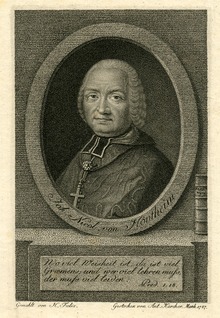Johann Nikolaus von Hontheim
Johann Nikolaus von Hontheim (born January 27, 1701 in Trier , † September 2, 1790 in Montquintin , municipality of Rouvroy (Belgium) ) was a Catholic auxiliary bishop and critic of the Pope's position in the Catholic Church. He also appeared under the pseudonym Justinus Febronius as a representative of the Catholic Enlightenment .
Life
Hontheim came from an old patrician family in Trier , attended the Jesuit school there and studied law in Trier, Leuven and Leiden , and in Leuven as a student of canonist Zeger Bernhard van Espen . In 1724 he was in Law in Trier to the doctor doctorate . However, he then decided to become a priest and learn about the administrative practice of the Curia in Rome. After his return to Germany he was first a full assessor at the Vicariate General , and in 1733 professor of Roman law ( Pandects and Codex ) at the old University of Trier . In 1738 he became head of the Koblenz official office , in 1742 privy councilor of Archbishop Franz Georg and in 1748 auxiliary bishop of the Archdiocese of Trier. The Auxiliary Bishop Christoph Nebel from Mainz donated him his episcopal ordination on February 16, 1749.
He spent the last ten years of his life mainly on his Montquintin estate in Luxembourgish. He died there in 1790.
Works
His Historia Trevirensis diplomatica (Trier 1750, 3 volumes; also: Prodromus , Trier 1757, 2 volumes) was followed by the book De statu ecclesiae et legitima potestate Romani pontificis liber singularis (Frankfurt 1763 ) under the pseudonym "Justinus Febronius" . In this regard, Hontheim tied in with the Councils of Constance and Basel , the Reichstag in Worms of 1521 and various concordats, as well as Gallicanism . a. against the papal jurisdiction and interference by the Curia in the administration and occupation of the dioceses in the Lorraine and Luxembourg neighborhood. Linked to this was the hope of overcoming the sectarian division that had existed since the Reformation . Hontheim demanded that the Pope should submit to a general council and that the position of the bishops vis-à-vis the Popes should be strengthened. Hontheim admits the Pope himself, following Augustin , Jacques Bénigne Bossuet , Petrus de Marca , van Espen and others, only an honorary priority among the bishops.
The work that he dedicated to the Pope himself was reprinted several times and translated into several languages, but banned by the Pope on February 27, 1764, placed on the Index Librorum Prohibitorum and burned in Rome.
When Hontheim was finally discovered as the author, he was urged to retract in 1778 by threats and promises. According to the content of Febronii commentarius in suam retractationem (“Febronius's comment on his revocation”), published in Vienna in 1781 , the revocation does not seem to have been meant seriously.
Regardless of the papal condemnation, "the Febronius " had a considerable influence on the Koblenz Gravamina of 1769 and the Ems puncture of 1786.
- Historia Trevirensis Diplomatica Et Pragmatica: Inde A Translata Treveri Praefectura Praetorio Galliarum, Ad Haec Usque Tempora: E Genuinis Scripturis Eruta, Atque Ita Digesta, Ut Non Solum Jus Publicum Particulare Archiepiscopatus & Electoratus Trevirensis. In Suis Fontibus & Ecclesime Exhibastic Exhibastic Germaniae, Ejusque Singularia Jura Publica Ac Privata Illustret . Veith, Augustae Vind. 1750 ( digitized edition of the University and State Library Düsseldorf )
literature
- Philipp Woker: Hontheim and the Roman Curie (= pictures from the history of the Catholic reform movement of the 18th and 19th centuries. Vol. 1, 1, 1). Schneider, Mannheim 1875.
- Franz Xaver Kraus : Hontheim, Johann Nikolaus von . In: Allgemeine Deutsche Biographie (ADB). Volume 13, Duncker & Humblot, Leipzig 1881, pp. 83-94.
- Otto Mejer : Febronius. Auxiliary Bishop Johann Nikolaus von Hontheim and his revocation. 2nd unchanged edition. Mohr, Freiburg im Breisgau 1885.
- Heribert Raab : Hontheim, Nikolaus von. In: New German Biography (NDB). Volume 9, Duncker & Humblot, Berlin 1972, ISBN 3-428-00190-7 , pp. 604 f. ( Digitized version ).
- Volker Pitzer: Justinus Febronius. The struggle of a Catholic Irishman for the unity of the Church in the Age of Enlightenment (= Church and denomination. Vol. 20). Vandenhoeck & Ruprecht, Göttingen 1976, ISBN 3-525-56522-4 .
- Friedrich Wilhelm Bautz : Johann Nikolaus von Hontheim. In: Biographisch-Bibliographisches Kirchenlexikon (BBKL). Volume 2, Bautz, Hamm 1990, ISBN 3-88309-032-8 , Sp. 1040-1042.
- Wolfgang Seibrich : The auxiliary bishops of the Trier diocese (= publications of the Trier diocese archive . Vol. 31). Paulinus, Trier 1998,
- Christopher Spehr: Enlightenment and Ecumenism. Attempts at reunification between Catholics and Protestants in German-speaking countries in the later 18th century (= contributions to historical theology. Vol. 132). Mohr Siebeck, Tübingen 2005, ISBN 3-16-148576-9 , pp. 34-48, (also: Münster (Westfalen), Univ., Diss., 2004).
Web links
- Literature by Johann Nikolaus von Hontheim in the catalog of the German National Library
- Works by and about Johann Nikolaus von Hontheim in the German Digital Library
- Entry on Johann Nikolaus von Hontheim on catholic-hierarchy.org
- Johann Nikolaus von Hontheim in the Saarland biographies
- USB Cologne portrait collection
Individual evidence
- ^ Paul Hinschius : The canon law of the Catholics and Protestants in Germany. Volume 1: System of Catholic Canon Law. With special consideration for Germany. Guttentag, Leipzig 1869, Google Book , accessed on February 4, 2010
| personal data | |
|---|---|
| SURNAME | Hontheim, Johann Nikolaus von |
| ALTERNATIVE NAMES | Justinus Febronius (pseudonym) |
| BRIEF DESCRIPTION | Auxiliary bishop and church lawyer in Trier |
| DATE OF BIRTH | January 27, 1701 |
| PLACE OF BIRTH | trier |
| DATE OF DEATH | September 2, 1790 |
| Place of death | Montquintin , Belgium |


